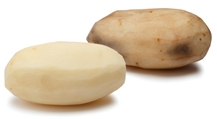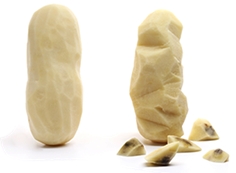More Sustainable Potatoes for reduced waste and lower acrylamide levels
|

| |

|
Bruise comparison of an Innate(r) Russet Burbank
vs. conventional Russet Burbank after 30 minutes.
| |
Innate(r) has up to a 44% reduction in bruising
compared to conventional Russet Burbank potatoes.
[photos: JR Simplot Company]
|
The United Nations Food & Agriculture Organization ranks potatoes as "the world's number one non-grain food commodity, with production reaching a record" 382 million tonnes in 2014. The issue of food waste is a widespread problem, but it is particularly important with potatoes, which are prone to bruising. Potatoes also produce, when fried, a chemical byproduct called acrylamide, which is thought may cause cancer above certain levels. Biotech solutions for these problems have been developed and are now on the market. Drop down for more...
The United States produces 44 billion pounds of potatoes each year, of which approximately 1.4 billion pounds (3%) are wasted due to bruising, costing producers some $90 million. The J.R. Simplot company has developed potatoes that are 44% less prone to bruising, in order to reduce food waste and improve production sustainability. At the same time they have improved these potatoes to contain substantially less of the amino acid asparagine, which at high temperatures (above 248 F; e.g., when fried) converts to acrylamide, a suspected carcinogen.
Simplot estimates that eliminating the waste lost to bruising would also save 6.7 billion gallons of water, reduce greenhouse gas emissions by 60 million pounds, and eliminate pesticide sprays on 170,000 acres of land.
It is not clear that acrylamide levels in fried potatoes are high enough to merit concern, but in any case, Simplot's second generation potato reduces acrylamide levels by up to 90%.
Both traits were delivered by adding to existing high quality cultivars certain genes from wild potato plants or relatives. The reduced bruising results from a process called "gene silencing" which was used to turn off the polyphenol oxidase (PPO) gene which produces the enzyme that causes browning. The reduced asparagine levels are the result of silencing the gene encoding for its production in potatoes. These reduced bruising, lower acrylamide potatoes are now commercially available in the United States, and have been approved for import into Japan.
Further innovations to control insect pests and diseases are being developed by researchers in both the private and public sectors, and some are close to commercialization.
|
|
|







